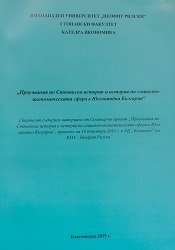
We kindly inform you that, as long as the subject affiliation of our 300.000+ articles is in progress, you might get unsufficient or no results on your third level or second level search. In this case, please broaden your search criteria.

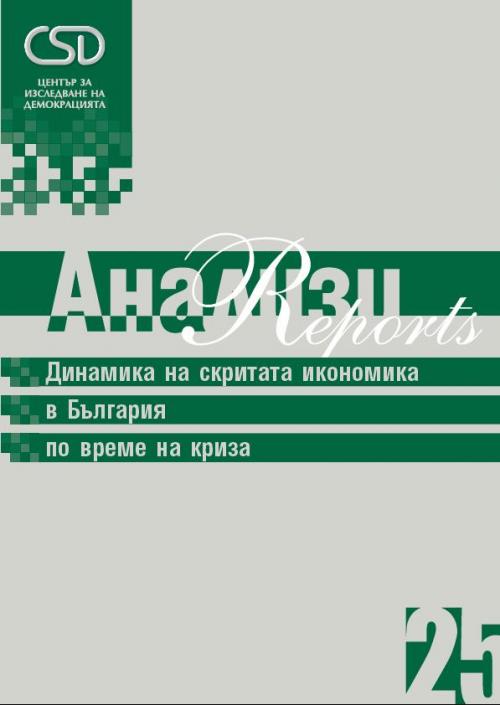
This publication provides an overview of the hidden economy dynamics in Bulgaria. The authors make an analysis of the effects of the crisis on the labor market and undeclared work based on the results from the Hidden Economy Monitoring System. After examining the European and the Bulgarian experience of the last five years, they make recommendations to the improvement of the public policies for reducing the hidden economy. The authors also justify the necessity of combining administrative control, socio-economic measures and structural reforms in the control administrations and the law enforcement agencies.
More...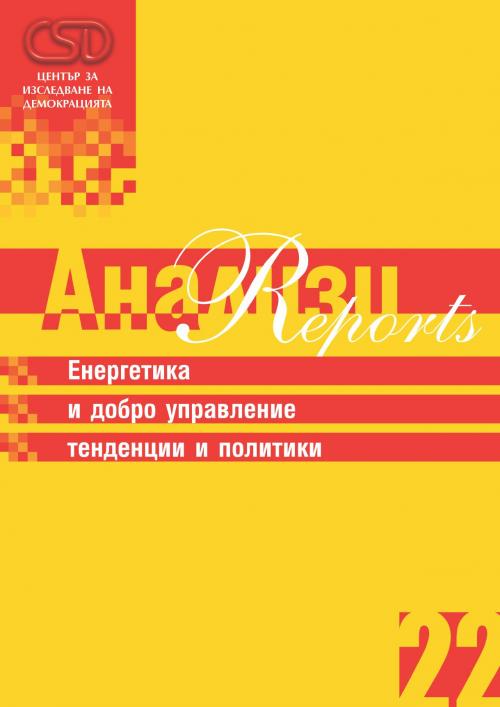
The report explores the major deficiencies in the strategic, institutional, and legal framework of the Bulgarian energy sector. The analysis of the management of state-owned energy companies and large energy infrastructure projects reveals the disregard for even the most fundamental principles of accountability and control in their planning and implementation. This has affected negatively the Bulgarian taxpayers and consumers, has jeopardized the financial stability of the state-owned energy companies, and, ultimately, has reduced the energy security of the country. The report recommends that the implementation of the large energy infrastructure projects be reconsidered and be based on a sound cost-benefit analysis with regard to Bulgaria’s energy security.
More...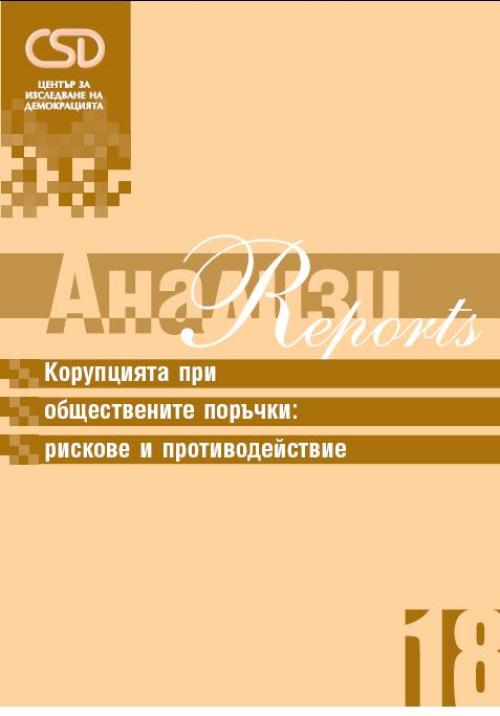
Public procurement is among those spheres in the management of the public sector in Bulgaria which are characterized by the highest corruption risk. Generally speaking, the abuses in this sphere relate to the awarding of the public procurement contract to a pre-selected supplier to the detriment of the public interest through violation of the principles of competition for the purpose of gaining personal benefit. The report examines the corruption in public procurement and assesses the losses from it. It also focuses on big corruption in public procurement with a view to the fine-tuning of the policy tools. This type of corruption covers all transactions and procedures which fall or should fall within the scope of the public procurement legislation. These are most of the supplies whose price or qualitative parameters are subject to negotiation between the contracting authorities in the public sector and the suppliers from the private sector.
More...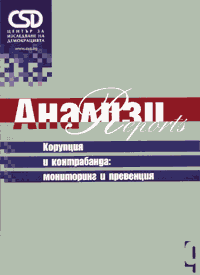
This is the second updated edition under the same title, published by the Center for the Study of Democracy of its Reports/ Analyses series to be distributed among participants in Regional Coordination Meeting of Subtable "Justice and Home Affairs" of Stability Pact Working Table III, held in Sofia on October 3rd, 2000. This latest analytical report is the outcome of the efforts of non-government organizations and state institutions, and of independent experts and journalists as well within the framework of the Coalition 2000 process. Launched in 1997, Coalition 2000 strives to support the restriction and curbing of corrupt practices in Bulgarian society, including regular monitoring of public perceptions and attitudes towards corruption. The illicit trafficking growth, as one of the most important sources of local "gray economy" throughout the 90ies, was caused by a number of international and internal factors, the most crucial of which being the weakening of the post-communist state and the spread of corruption practices among state officials. The threat on society posed by the interlacing of the interests both of crossborder crime perpetrators and the associated corrupt public officials (customs officials being the most alarming example according to public opinion), became a serious public concern. This initiated the necessity to analyze the phenomenon and to identify adequate monitoring and counteraction measures, moreover this type of crime finds further confirmation in experts' estimate that a large portion of the local gray economy is related to smuggling of goods and the proceeds of the respective unlawful activities. The report examines the processes of illegal trafficking and the related corruption in Bulgaria, identifying their typical manifestations and the practical assessment, prevention and control strategies and methodologies in three sections as follows: • an analysis of crossborder crime in Bulgaria during the 90ies; • a review of the sociological and statistical methods of measuring illicit trafficking; • Practically oriented proposals with the aim of curbing corruption and trafficking. The first section emphasizes on the combined impact of trafficking and corruption in the context of current criminological environment in this country and the increasing crossborder nature of crime. The problem has been deliberately set in the national context, seemingly isolated from global crime. The second section of the paper (Monitoring the illegal trafficking) proposes two relevant methods of measuring the contraband merchandises imported in the country and the sample survey methods for assessing of smuggling. One of them, the "mirror statistics" method, compares overseas and local official data regarding the export/import of this country. It is applied to assess the scope of the gray economy as a whole, and to locate the main "contraband markets" in Bulgaria. In addition, an original mechanism is developed, which combines monitoring through sample interviews, with exerting control over contraband goods. This mechanism is oriented towards future cooperation between local NGOs and public authorities (customs and police). The third section of the paper consists of proposed measures to be undertaken to curb illegal trafficking and corruption in this country. It is coined after the Coalition 2000 Anti-Corruption Action Plan and outlines the synergy of public sector reform and civil society anti-corruption initiatives. It also stresses on the importance of enhancing international cooperation in the framework of Bulgaria's EU accession. Statistical data provided by the Customs Agency have been used in this second updated edition of the paper. A number of recommendations by the Agency's experts have also been taken in consideration.
More...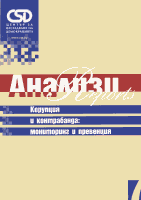
Corruption and Trafficking: Monitoring and Prevention titles the new brochure, recently published by the Center for the Study of Democracy of its Reports and Analyses series. It is the first analytical output of the newly founded Expert group on corruption and illegal trafficking as part of Coalition 2000 anti-corruption activities. The phenomenon of illicit trafficking has become one of the most important sources for the “shadow economy” in Bulgaria throughout the 90ies. Its growth was caused by a number of international and internal factors as well; the most crucial of which is the weakening of the post-communist state and the spread of corruption practices among state officials. Hence the emerging of the criminally interwoven corruption/trafficking involve state officials (policemen, customs officers, senior civil servants and politicians) on the one hand, and semi-criminal groups and local mafia on the other. Bulgarian “contraband channels” also constitute a part of the wider network of transnational crime. In the forthcoming brochure, however, the emphasis is on Bulgarian trans-border crime, rather than on its international ramifications. The brochure is composed of three parts: - an analysis of trans-border crime in Bulgaria during the 90ies; - a review of the sociological and statistical methods of measuring illicit trafficking; - practically oriented proposals with the aim of curbing corruption and trafficking. In the second part of the brochure (Monitoring the illegal trafficking) the authors propose two relevant methods of measuring the contraband merchandises imported in the country. One of them is the “mirror statistics” method, which consists of comparing Western and Bulgarian official data about the export/import of the country. It is used to assess the scope of the gray economy as a whole, and for locating the main “contraband markets” in Bulgaria. In addition, an original mechanism is developed, which combines monitoring through sample interviews, with exerting control over contraband goods. This mechanism is oriented towards future cooperation between local NGOs and public authorities (customs and police). The third part of the brochure consists of proposed measures to be undertaken to curb illegal trafficking and corruption in this country. It is coined after the Coilition 2000 Anti-Corruption Action Plan and outlines the synergy of public sector reform and civil society anti-corruption initiatives. It also stresses on the importance of enhancing international cooperation in the framework of Bulgaria’s EU accession.
More...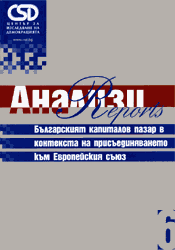
The objective of this report is to contribute to the discussion on the capital market reform in Bulgaria in preparation for eventual integration into the European Union. The report views the accession issue on two levels. The first one is whether the necessary capital market institutions and legislation are in place, while the second one is whether capital markets function in a manner that supports economic growth and development. The impetus for the development of the capital markets in Bulgaria was the first wave of the mass privatization program. This program was similar to the program implemented earlier in the Czech Republic. At the same time the Czech Republic is among the first countries in transition that has been invited to negotiate accession with the European Union. For these reasons it is useful to compare the process of capital market developments in both countries. However, it should be taken into consideration that because of the problems that have surfaced recently in the Czech capital markets, the Czech example does not necessarily furnish solutions to the problems that are likely to arise. A large number of the companies are listed on the Bulgarian Stock Exchange-Sofia, but in practice the majority of the smaller ones have not been traded at all. While the unadjusted market capitalization figure amounts to roughly 0 million, this includes all investment funds, holding companies and all shares in partially privatized state owned companies. The actual figure for shares not held by the Government and available for trading on the BSE-Sofia is probably closer to 5 million. This works out to 1 per participant in the mass privatization program, which is a little above one-month’s salary. The market also has very low levels of turnover. Turnover figures at the individual company level are available only for trades on the BSE-Sofia. Most company shares have been traded very few times since the stock market opened. Only eight companies have traded shares in more than half of the sessions for which they were registered.
More...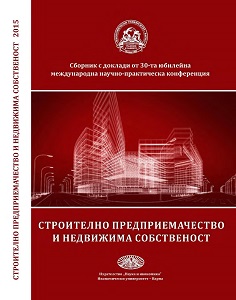
The International Scientific and Practical Conference “Construction Entrepreneurship and Real Property” is held every year since 1985 by the Department of Economics and Management of Construction. The topic of the Conference „Construction Entrepreneurship and Real Property” has not changed since 2006, but the topics of the papers are up-to-date and comprehensive. The topic of the conference results from the special nature of the economic settings in Bulgaria and is largely predetermined by the continuing problems in banking, construction business and real estate management. The main focus is on the issues of economics and management of construction, urban planning and real properties.
More...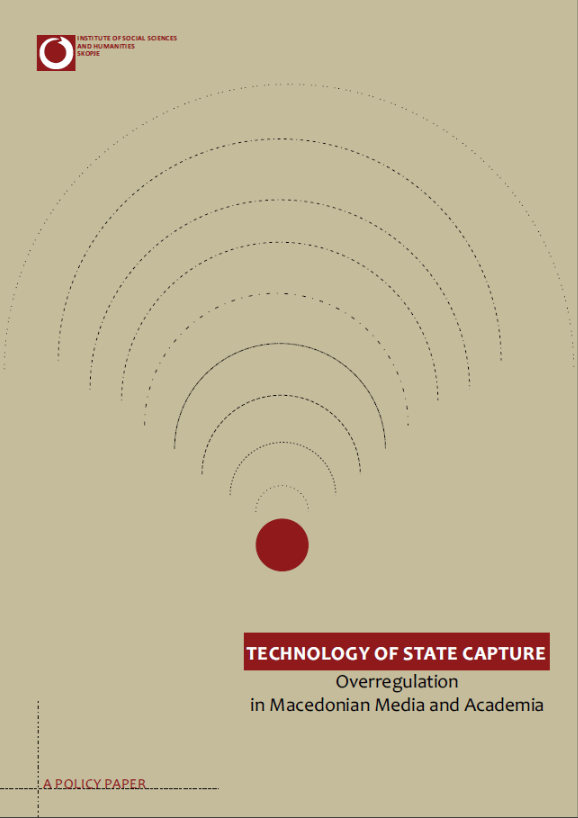
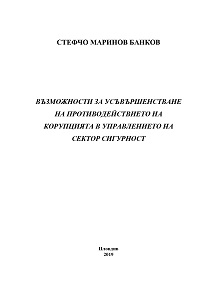
The study offers an effective methodology through which one can determine the steps which must be undertaken in order to investigate crimes of general character, as falling under Chapter VIII, Section II and Section IV from the Penal Code. The study presents an interconnected methodology of investigation starting from the moment of receival of a complaint, through the operational work carried out within the framework of the penal persecution, up until the stage of submission of the bill of indictment, as well as a detailed analysis and conclusion on the problems surrounding the specific instance of corruption in the Ministry of Interior Affairs. The latter analysis encompasses the crimes that the policeman committed, an assessment of his personality and illegal behavior, as well as an analysis of the ways to enhance the practices to prevent corruption in the future. The topic of the dissertation is pressing in the field of the fight against against corruption and it suggest how better efficiency and coordination could be achieved between and wihin the different organs and structures. The paper suggests also how the institutional framework could be adapted to better fit its purpose, which can only be done if indepedenent, competent and honest persons are placed in the leading positions of the anticorruption authorities. Without this, no system could safeguard its effectiveness. The scientific novelty is in the complex analysis of the efficiency of the current model aiming at fighting corruption in the "Security Sector".
More...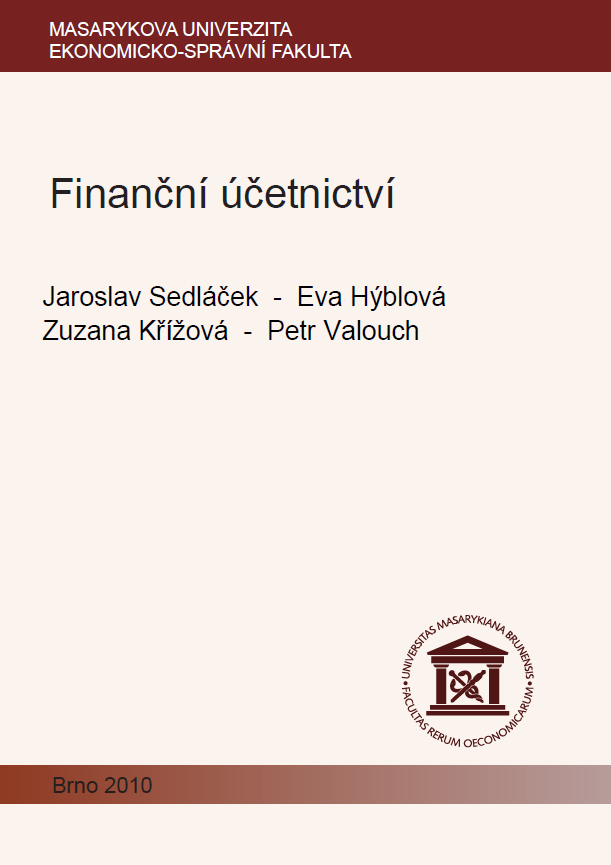
Cílem tohoto studijního textu je uvést budoucí ekonomy do problematiky finančního (podvojného) účetnictví tak, aby pochopili jeho filosofii, jeho úlohu v řízení podniku a jeho význam pro vnější okolí podniku. Hlavním úkolem současného účetnictví je věrně a poctivě zobrazit skutečnost. Kvantifikuje primárně ekonomické jevy a proto je úzce spjatos rozhodováním, avšak na druhé straně uznává požadavky obchodního a daňového práva. Čtenáři se seznámí s účelem a funkcí účetnictví, s jeho právní úpravou a se základními účetními prvky a principy, na které navazují základní postupy účtování o hospodářských transakcích, s nimiž se setkáváme v podnikové praxi. Výklad obsahuje obecné teoretické přístupy včetně jejich praktického uplatnění v oblasti hospodaření podniků.
More...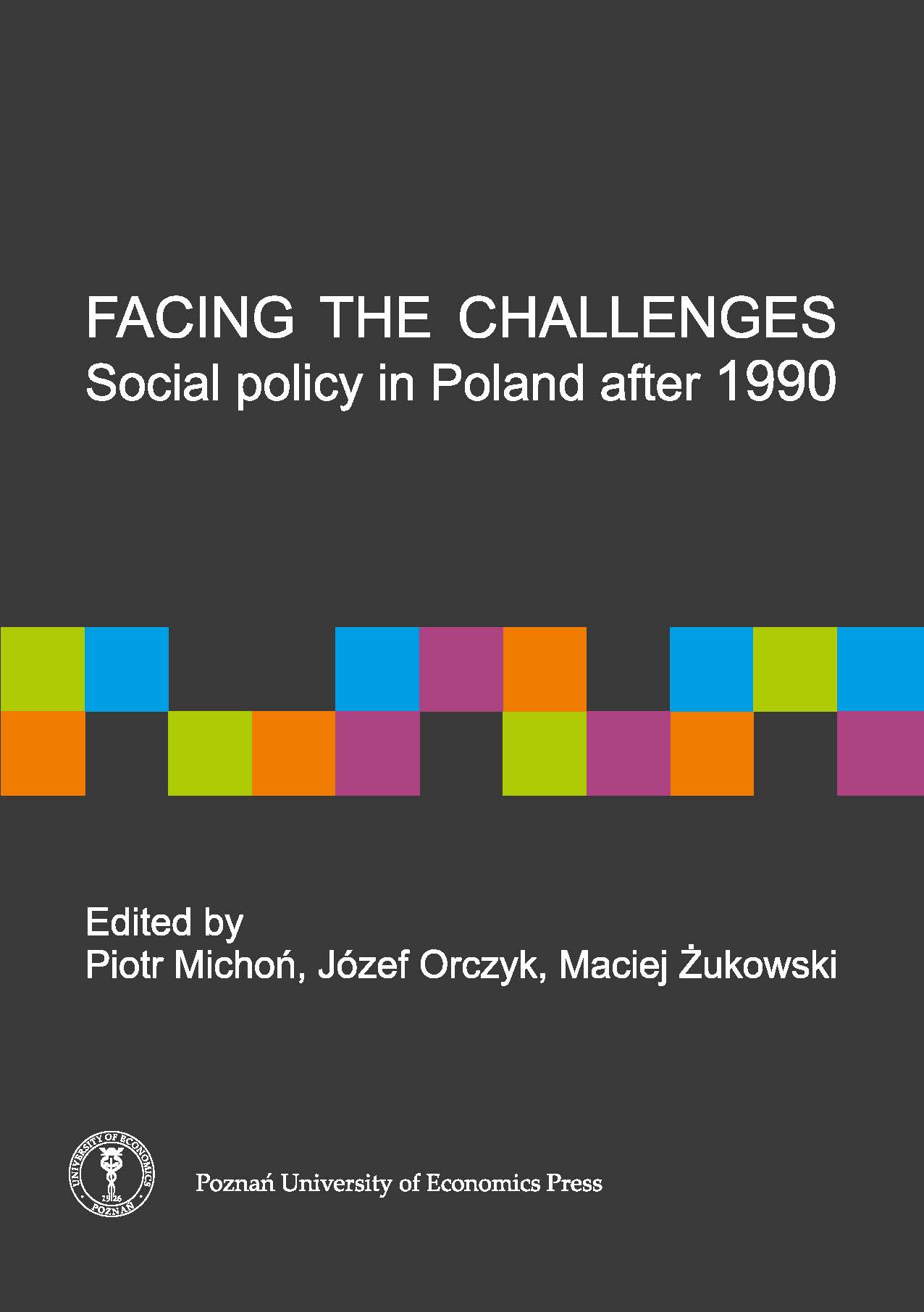
Polish social policy is changing not only in the material sense but also on the level of public consciousness. This concerns not only citizens, but also researchers and policy makers. Social policy in Poland after 1990 has its own specificity. One of its features are the lack of clear direction of development and the constant need for amendments. Unsurprisingly, diversity of approaches can be also found on the cognitive level, although it is not reflected in all sets of studies. This regards not only ideological differences and various appraisals of the same facts, but also the often underestimated domination of particular paradigms. The latter can be discerned in this monograph as well, as the effect of the authors’ provenance and the widespread approval of certain ways of thinking about and analyzing particular fields of social policy. The monograph has been divided into two parts. The first consists of the general studies of changes that took place on the institutional level and in public consciousness. The second part focuses on evaluating changes that occurred in particular fields of social activity which are strictly connected with the state’s social policy. The selection of those fields and the dissimilarity of approaches should encourage the reader to reflect upon thevariability of importance of material and consciousness factors in evaluating social policy (Józef Orczyk, Foreword).
More...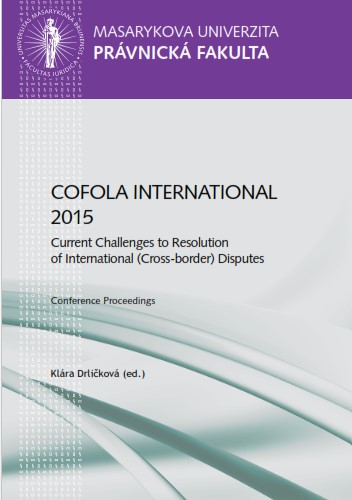
The conference “COFOLA = Conference for Young Lawyers” is annualy organized by the Masaryk University, Faculty of Law from 2007. The main aim of this conference is to give floor to the doctoral students and young scientists at their early stage of career and enable them to present the results of their scientific activities. Since 2013 COFOLA has been enriched by special part called “COFOLA INTERNATIONAL”. COFOLA INTERNATIONAL focuses primarily on issues of international law and the regulation of cross-border relations and is also oriented to doctoral students and young scientists from foreign countries. COFOLA INTERNATIONAL contributes to the development of international cooperation between students and young scientists from different countries.
More...
This book addresses various aspects of the energy sector of the Czech Republic. There is hardly a more turbulent and more sensitive sector of the economy of the Czech Republic than the energy sector. As a result, its future is carefully monitored by not only the political and economic elite of the country, but also by the general public. The book The Energy Sector and Energy Policy of the Czech Republic is divided into eight chapters. The fi rst describes the key actors and the legislative framework of the energy sector of the Czech Republic, including an analysis of the Government, the Ministry of Industry and Trade, the Ministry of the Environment, and other legislative and regulatory bodies and political parties. The second chapter introduces the rich and complicated history of the development of the Czech national energy sector. The following chapters familiarize the reader with the coal, oil, natural gas, nuclear, renewables industries, and electricity and heat. The book is recommended to scholars and researchers, as well as experts in the relevant fi elds of study, but will also serve as a guide for those outside academia who work with the topic daily, such as in public administration. Finally, the general reader can make great use of this book to gain a thorough yet accessible impression of the Czech energy sector.
More...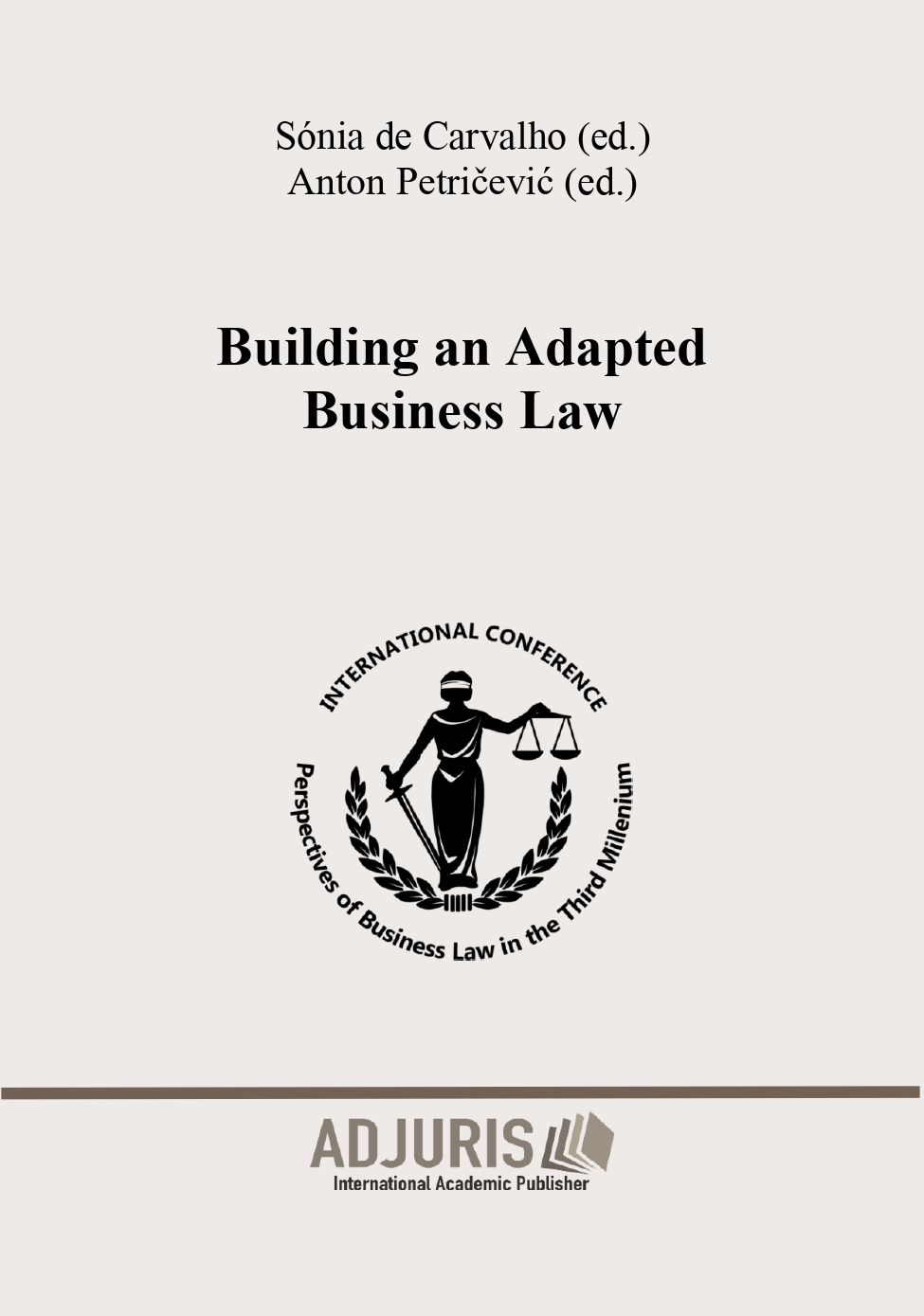
This volume contains the scientific papers presented at the Eleventh International Conference „Perspectives of Business Law in the Third Millennium” that was held on 19 November 2021 in online format on Zoom. The conference is organized each year by the Faculty of Law of the Bucharest University of Economic Studies together with the Society of Juridical and Administrative Sciences. The scientific studies included in this volume are grouped into five chapters: Stop or go back to business as unusual — legal issues impacting businesses during this time; Changes in the legal landscape, regulatory challenges and more; In-depth look at business law topics; European overview of the legal and business considerations. The present volume is addressed to practitioners, researchers, students and PhD candidates in juridical sciences, who are interested in recent developments and prospects for development in the field of business law at international and national level. This book is edited with the support of the Romanian Ministry of Education and Research.
More...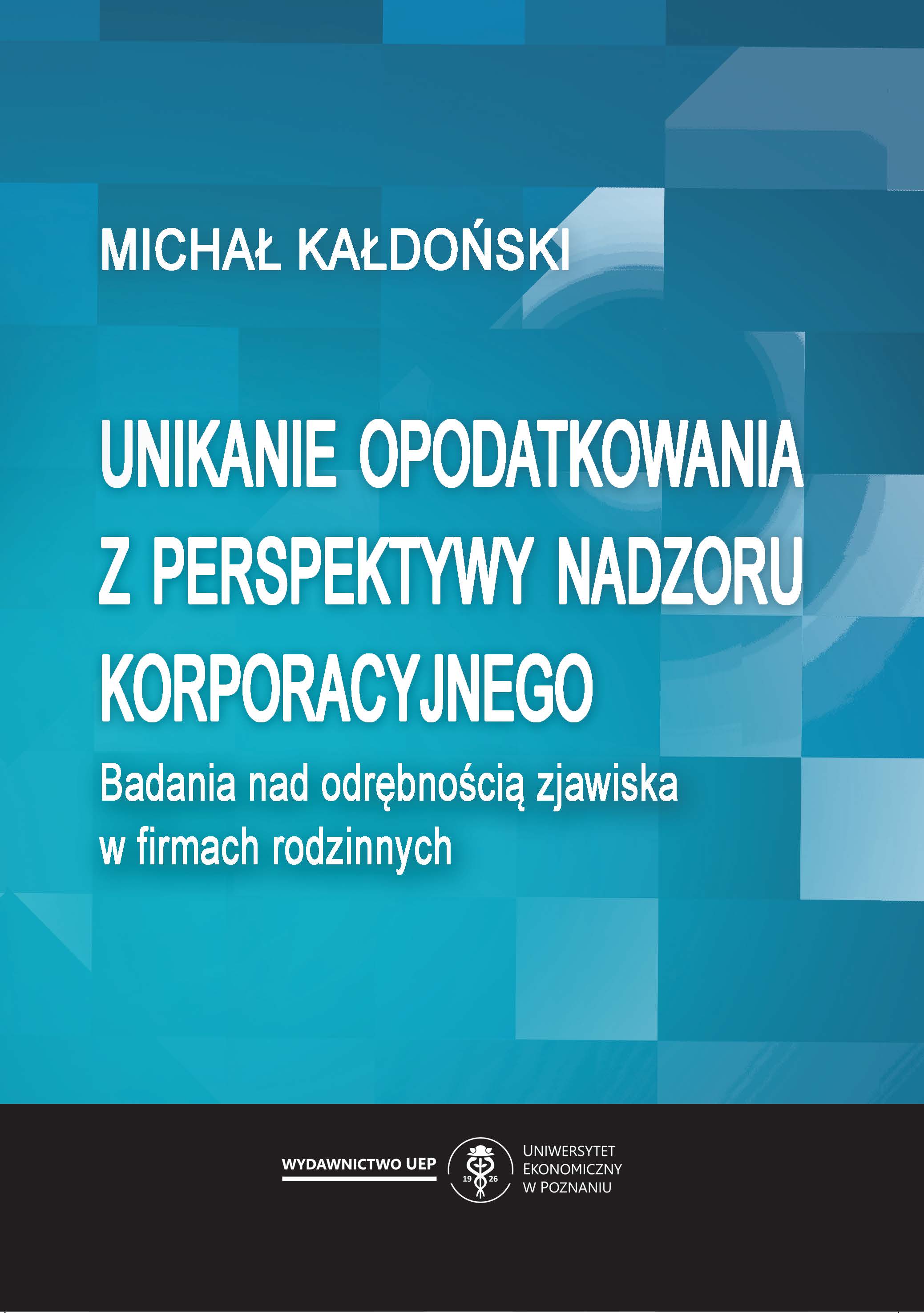
Monografia skupia się na analizie unikania opodatkowania w przedsiębiorstwach rodzinnych. Do przeprowadzenia badań empirycznych wykorzystano dane z ponad 10 tys. spółek z 37 państw, a także syntezę istniejących prac naukowych, jakie są dostępne w literaturze światowej. Książka ma charakter pionierski w wymiarze krajowym, wnosi także istotny wkład do światowej wiedzy finansowej.
More...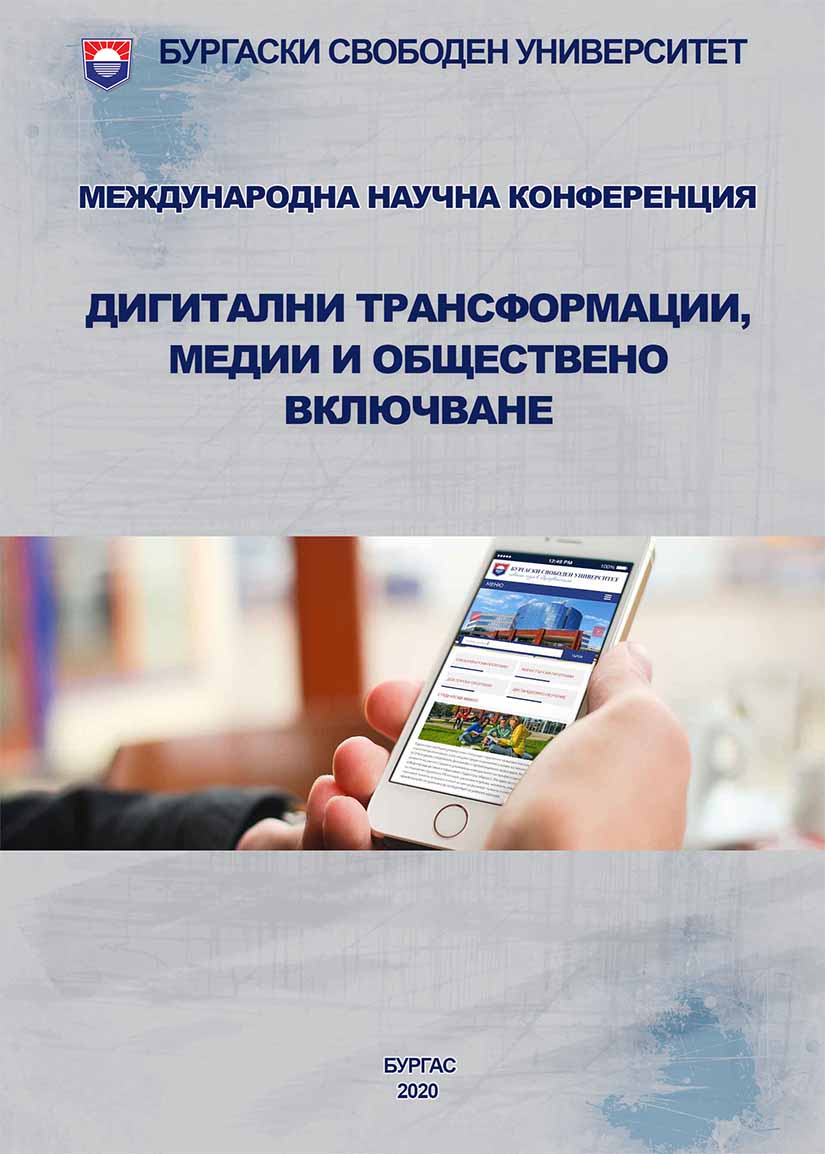
The focus of International Scientific Conference “Digital Transformation, Media and Inclusion”, organized by Burgas Free University, is the economic, regulatory, technological and societal aspects of the arising innovations resulting from the digital transformation.
More...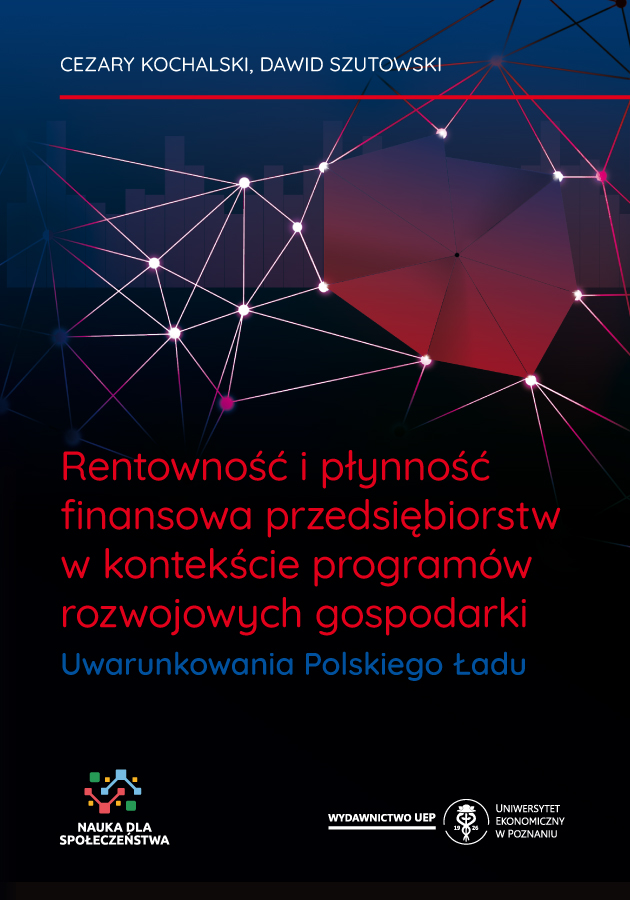
Celem monografii jest rozpoznanie możliwości posługiwania się narzędziami analizy ekonomicznej przy ocenie rentowności i płynności finansowej przedsiębiorstw w kontekście programów rozwojowych gospodarki. W warstwie empirycznej publikacji odwołano się do uwarunkowań programu Polski Ład. W badaniach nad oddziaływaniem realizacji programów rozwojowych na kondycję finansową przedsiębiorstw sięgnięto zarówno do tradycyjnych metod analizy finansowej, jak i coraz powszechniej wykorzystywanych niedeterministycznych systemów uczących się, to jest sieci neuronowych. Zwrócono uwagę na potencjalny związek wdrożenia Polskiego Ładu z sytuacją finansową przedsiębiorstw, scharakteryzowano możliwości posługiwania się danymi mikro i makro przy ocenie rentowności i płynności finansowej przedsiębiorstw, zidentyfikowano związki między zmiennymi makroekonomicznymi a wymienionymi zjawiskami finansowymi oraz przedstawiono wyniki badania obejmującego lata 2003–2021. Publikacja dofinansowana ze środków budżetu państwa w ramach programu Ministra Edukacji i Nauki pod nazwą „Nauka dla Społeczeństwa”, nr projektu NdS/543640/2021/2022, kwota dofinansowania 12 000 zł, całkowita wartość projektu 699 200 zł.
More...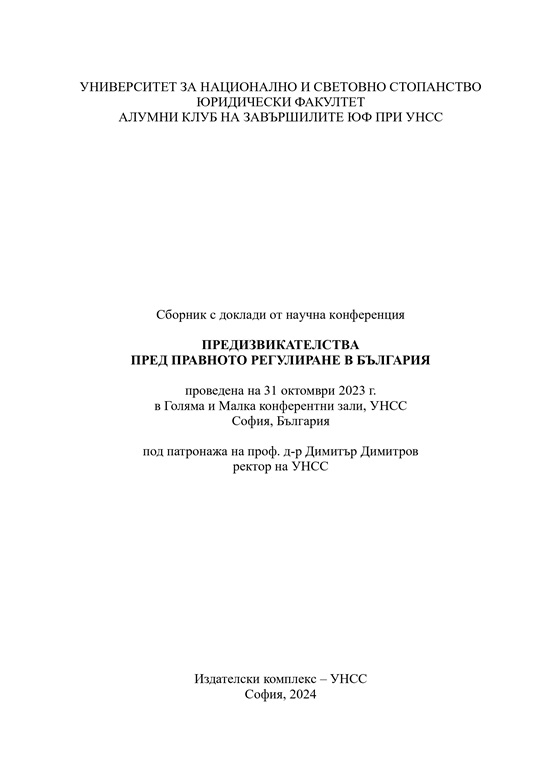
The collection contains reports presented at scientific conference "Challenges to legal regulation in Bulgaria". The conference was held on October 31, 2023 in the conference halls of the university in parallel modules. Scientists, practitioners, doctoral students and students participated, a total of over 60 people in five scientific fields: Challenges to international law and EU law in Bulgaria; Challenges to private law regulation in Bulgaria; Historical and economic aspects of state regulation in Bulgaria; Challenges to public law regulation in Bulgaria; Challenges to criminal law regulation in Bulgaria.
More...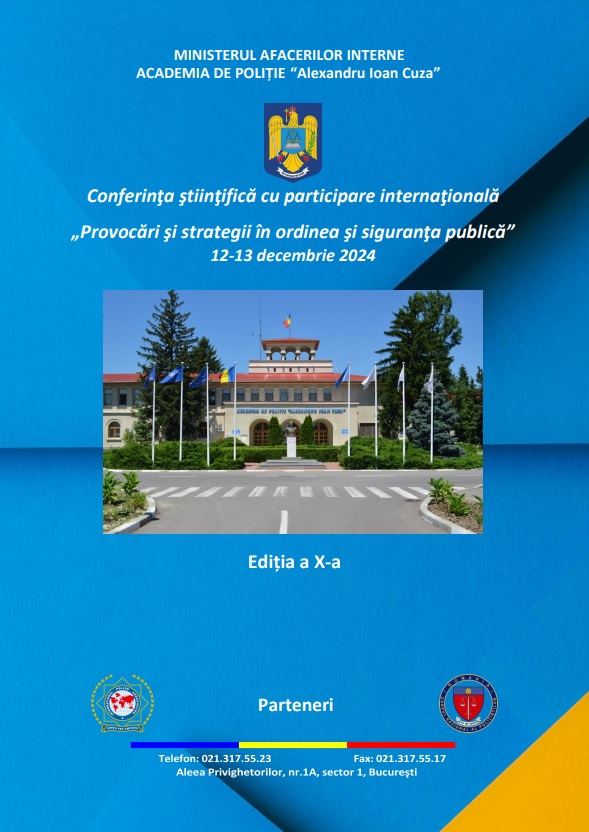
The safeguarding of public order and safety faces escalating challenges due to evolving threats and social changes. This collective work explores the primary obstacles confronting public order and safety, including technological disruptions, transnational crime, and community trust deficits. Furthermore, it evaluates strategic responses, such as the integration of advanced technologies, cross-border cooperation, and community-focused policing. The findings highlight the need for a multidisciplinary approach to address these challenges effectively and provide actionable insights for policymakers and practitioners seeking to enhance public safety resilience.
More...